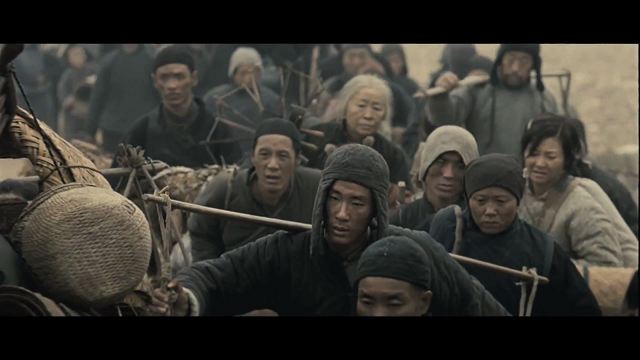
The Rome Film Festival is now over and there were so many films that I would love to write about, but one in particular stands out in my mind. It is the gut-wrenching epic BACK TO 1942 by Chinese director Feng Xiaogang.
The film tells the story of the famine in Henan province in China in 1942, during which 3 million people died and hardly anyone in China or the rest of the world was aware. The story begins with Landlord Fan hosting a banquet in his household for hundreds of starving farmers, but the banquet goes terribly wrong as Fan’s servants and farmers end up in a deadly fight leaving Fan’s house burnt to the ground and his son dead. Fan starts on his long journey with his wife, pregnant daughter-in-law, his beautiful teenage daughter (played by Chinese star Xu Fan), and a loyal servant.
On the road they join up with a neighboring farmer, his wife, mother and two little children. The group endures endless tragedy as they make their way towards Shanxi province, slowly starving to death. The are bombarded by Japanese bombs, and they are attacked by retreating Chinese soldiers. The daughter-in-law dies in childbirth, the grandmother dies, along with Fan’s wife, and the younger women are sold off in exchange for food along the way.
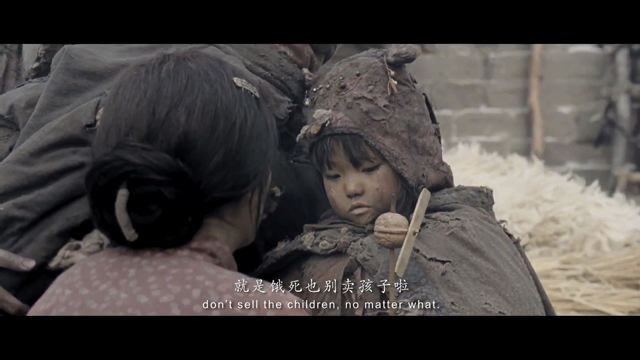
During the festival I had the chance to interview the director and I was amazed at what he had to say. It took Feng Xiaogang 20 years, lots of money, patience, determination and courage to make the film. He began preparing the film in 1993 after reading “Remembering 1942” by Liu Zhenyun (a book based on the recollections of a survivor who appears as a young girl in the last scene of the film). As Feng explained, his first attempt to do the film was in 2000, and it failed. That was followed by two more failed attempts in 2002 and 2004. Feng said finally, thanks to some of his commercial film successes, he was able to earn enough money to proceed with the project in 2010. Director Feng also said that he had some difficulty persuading the Chinese government to let him do the film, and he is concerned about both the reaction of the public and the government when it is released. Feng told me, “I believe the government is more concerned about the sensitive subject matter, because the story is so cold, so brutal, so negative, they are concerned that is going to have a bad influence on the audience.”
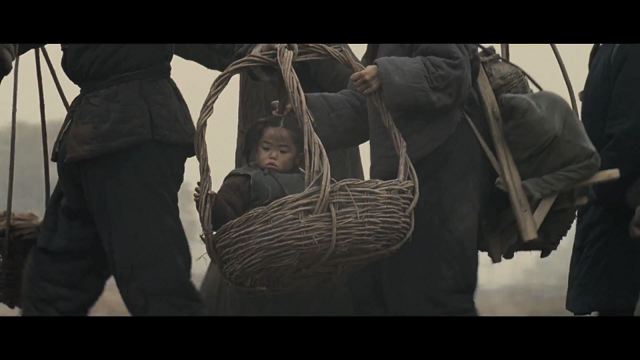
I also interviewed actress Xu Fan who told me that she knew nothing about the Henan province famine before getting involved in the film project. She said that her main sources of information were Liu Zhenyun’s book and photographs taken by American journalist Theodore White.
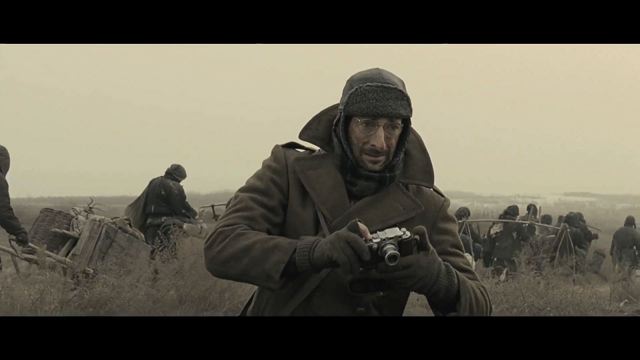
The film follows the parallel story of Theodore White (played by Adrien Brody) who travels to Henan province and is shocked by what he sees. He photographs wild dogs feasting on the remains of dead refugees as other starving refugees file past, and he risks his own life to tell their tale. He then struggles to bring his story to Chinese leader Chiang Kai-shek who is too preoccupied with the war with the Japanese and prefers to ignore the problem. White eventually publishes his story in Time Magazine forcing the Chiang Kai-shek to take action.
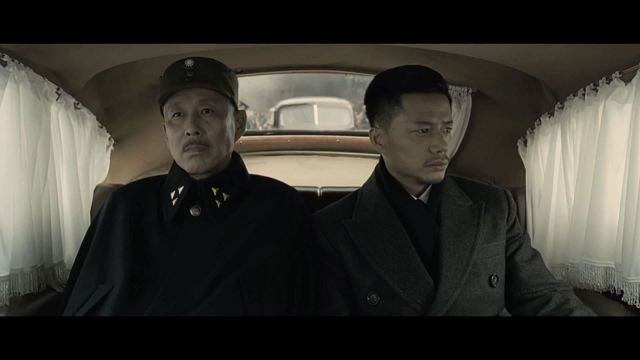
As a journalist I was particularly struck by the courage and obstinacy in obtaining the story shown by Theodore White (played by Adrien Brody). I left the film contemplating what I feel were the good old days of journalism before there were cell phones, blackberries, internet, email, twitter and all sorts of other technology that help us get the story out almost continuously at the expense of in-depth reporting and accuracy. I spoke to actor Adrien Brody on the red carpet at the festival and he said, “That is what journalism is all about, right? You are able to create awareness of something as horrendous as mass starvation, and refugees who are not being attended to. Theodore White by his tenacity was able to put some pressure on the Chinese government, by exposing this, and he was instrumental in saving many people’s lives and hardship. And so, that is wonderful.”
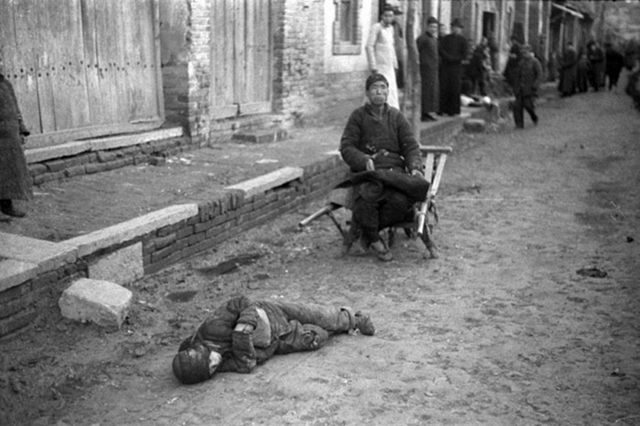
Some days I wonder if raising awareness, exposing terrible events, and putting pressure on powerful people to right them is what journalism is all about anymore. Or is it being the first to tweet? and is it being the one to get the most shocking video that gets the most hits on youtube? But to play the devil’s advocate with myself, I must admit that modern technology would have made it possible for more people to be aware of the Henan Province famine and perhaps more lives would have been saved. Nevertheless, the world today could use more journalists of Theodore White’s courage and calibre.
The film will come out on November 29th in China in some 8,000 theaters. I am curious to see how it will be received. I asked the director if the film will be distributed in the United States and he said he approached two American distributors who turned it down because it is in Chinese, “American don’t like to read subtitles” they told him. That is shame. BACK TO 1942 is a film is worth seeing.

Great review & essay – I agree with much of what you say about the race to tweet, etc., BUT if it weren’t for Twitter, I wouldn’t have first person news about the atrocities in Gaza these five days – to balance out what I feel is often an Israel-focused press.
Thanks Els. I agree with you. I have mixed feelings. Sometimes I feel that cell phones, blackberries and twitter, are suffocating real journalism, but there is definitely a point to be made that the more information available on injustice in the world, the better off we all are.
. . there is also the pressure to sanitise everything (to protect the sensibilities of the people or the reputations of the powerful?). This is an excellent post – if nothing else I’m now hunting down an English translation of the book.
Hi Alan– What I couldn’t understand is why the communist party government would be worried about covering up the errors of the Kuomintang and Chiang Kai-Shek. They didn’t like the guy either. I know very little about Chinese history and I need to read more.
I’m sure it will eventually come to light in the US. There are PLENTY of subtitled films on netflix. Right now the Chinese government is only interested in glorious stories about itself while burying any inconvenient embarrassments from the past….AND also while shouting out loud to its people about every past embarrassment of the US.
Hi Barbara — I really admired the courage of this director to take on such a sensitive subject and push it through to completion — it took him 20 years, a lot of his own money, and real determination. Well done Feng Xiaogang!
Thanks SO much for this film’s backstory. And I am now eager to see it, and feel a pang that it won’t be shown here, with subtitles! The film, reporter White’s story, and your reflections, seem in many ways to be one with my own post, about which you wrote an in-depth comment, on global warming and apocalyptic change, and how hope comes to this. Journalism was the hope here, and White the Christ-like figure, who came into that world and that horror, walked with them, really saw and understood it, and raised his ‘voice’ to save many. I think this is yeast at work in your own spirit, what stories you want to tell and how, and what you have told, and how best to reach us all. Which you keep on doing- as your blog becomes deeper, more discerning, rich in thought. Thank you –
Thank you. I am not so sure my blog is becoming deeper and more discerning but at least it is an outlet that I can use as I see fit. My work with AP is not that way. We are under a lot of pressure to get news out quickly which does not allow for much reflection. I do not blame my company or my bosses, it just seems to be the way journalism is moving, and unless you are working for the New Yorker or a documentary film company, it is hard to cover the stories the way I would like.